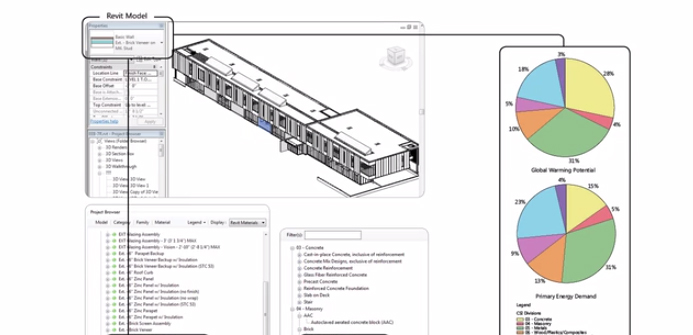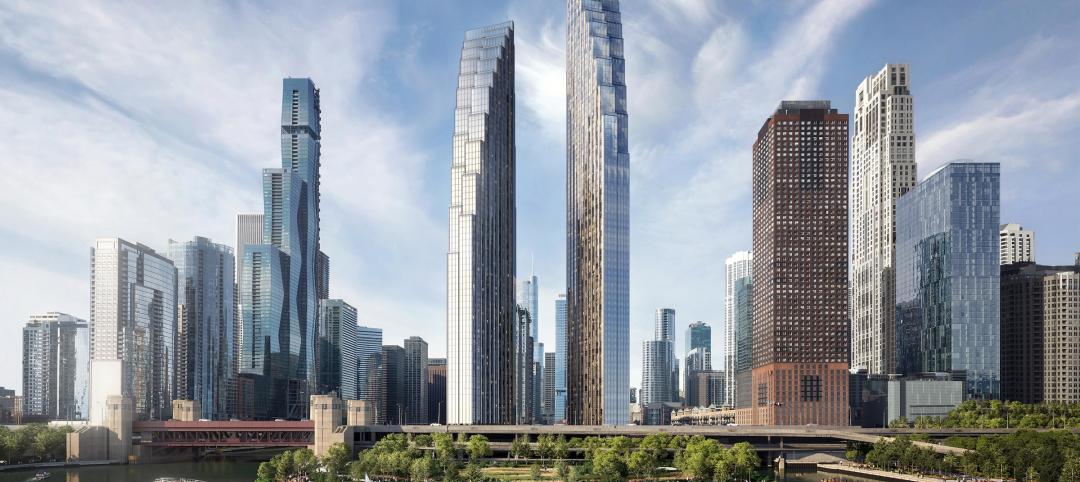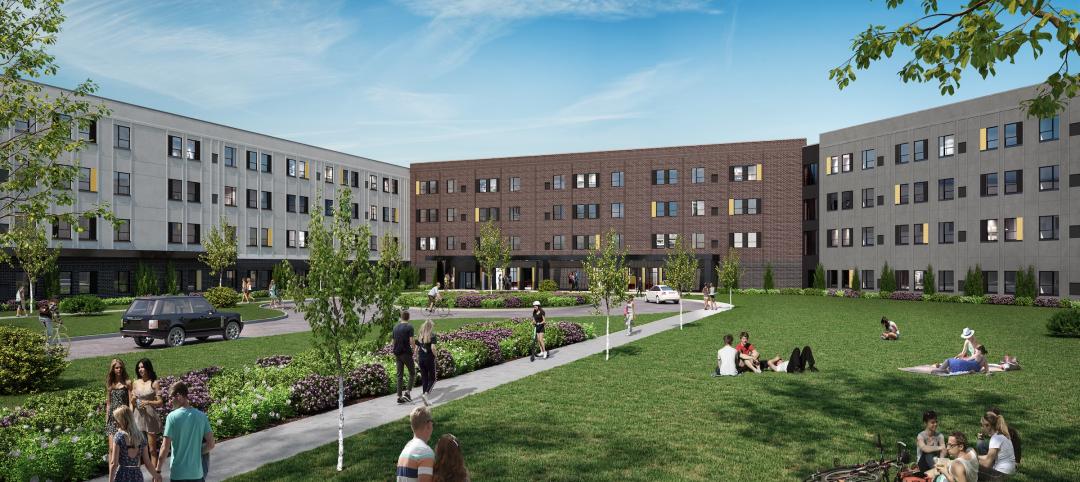Architecture firm KieranTimberlake, in conjunction with PE International and Autodesk Sustainability Solutions, announce the commercial availability of Tally, a software application for Revit that calculates the environmental impact of building materials.
It is the only application to be fully integrated into Revit, providing architects, engineers, and building professionals with insight into how materials-related decisions made during design influence a building’s overall ecological footprint.
Backed by the rigor and credibility of GaBi data from PE International, the application enables life cycle assessment (LCA) on demand, documenting information across eight life cycle impact categories that align with LEED v4 and other rating systems.
The commercial release follows a three-month public beta, in which nearly 500 users tested Tally and provided feedback on a broad range of design scenarios.
Bringing Life Cycle Data to the Design Process
While working in a Revit model, Tally users correlate modeled elements to a custom LCA database built on GaBi, the largest environmental dataset for LCA used by leading corporations worldwide for both internal and critically-reviewed published studies. The database combines material attributes, assembly details, engineering and architectural specifications with environmental impact data, including branded information from manufacturer environmental product declarations (EPDs).
“Tally empowers design professionals to evaluate product impacts early in the design phase, enabling smarter material selection, and ultimately the construction of better, high-performance buildings,” states Heather Gadonniex, director of strategic business development for PE International.
“Tally addresses a range of questions, whether comparing a whole building to a benchmark, exploring variations in building massing or construction type, or selecting finishes,” explains Roderick Bates, Tally development team leader at KieranTimberlake. “It can show where the largest environmental impacts reside within a design, and ways in which they compare across material options.”
Complete Bill of Materials
Buildings are composed of thousands of parts, each with their own origins and manufacturing flows, not all of which are accounted for in a Revit model. Tally helps paint a comprehensive portrait of a building and the products that go into it.
The specific quantities of materials like paint, sealants, fasteners, or grout not modeled in Revit are essential to a life cycle assessment. Tally lets users assign materials and quantities, then leverage the tool to perform material takeoffs and provide a complete bill of goods for a building. Currently, no other environmental assessment tool provides this function.
New enhancements and features have been released in the commercial version:
- Data can now be added to a Revit template to save time and promote firm-wide consistency.
- Elements from linked models can be filtered by phase and workset.
- New assemblies have been added, including a wide array of cladding panels, complete with hardware and finishes.
- New materials have been added, including actual GaBi life cycle data from product manufacturer EPDs.
Pricing and Information
Tally is available immediately as a 30-day free trial through Autodesk Exchange or http://www.choosetally.com, where video tutorials are also available. After 30 days, a license must be purchased to continue use. The cost per floating license is $1,200 USD annually. Educational licenses for non-commercial use are available by request to support@choosetally.com.
Related Stories
University Buildings | Jun 28, 2024
The American University in Cairo launches a 270,000-sf expansion of its campus in New Cairo, Egypt
In New Cairo, Egypt, The American University in Cairo (AUC) has broken ground on a roughly 270,000-sf expansion of its campus. The project encompasses two new buildings intended to enhance the physical campus and support AUC’s mission to provide top-tier education and research.
MFPRO+ New Projects | Jun 27, 2024
Chicago’s long-vacant Spire site will be home to a two-tower residential development
In downtown Chicago, the site of the planned Chicago Spire, at the confluence of Lake Michigan and the Chicago River, has sat vacant since construction ceased in the wake of the Great Recession. In the next few years, the site will be home to a new two-tower residential development, 400 Lake Shore.
Codes and Standards | Jun 27, 2024
Berkeley, Calif., voters will decide whether to tax large buildings with gas hookups
After a court struck down a first-in-the-nation ban on gas hookups in new buildings last year, voters in Berkeley, Calif., will have their say in November on a measure to tax large buildings that use natural gas.
Mass Timber | Jun 26, 2024
Oregon State University builds a first-of-its-kind mass timber research lab
In Corvallis, Oreg., the Jen-Hsun Huang and Lori Mills Huang Collaborative Innovation Complex at Oregon State University aims to achieve a distinction among the world’s experimental research labs: It will be the first all-mass-timber lab meeting rigorous vibration criteria (2000 micro-inches per second, or MIPS).
Sustainability | Jun 26, 2024
5 ways ESG can influence design and create opportunities
Gensler sustainability leaders Stacey Olson, Anthony Brower, and Audrey Handelman share five ways they're rethinking designing for ESG, using a science-based approach that can impact the ESG value chain.
Student Housing | Jun 25, 2024
P3 student housing project with 176 units slated for Purdue University Fort Wayne
A public/private partnership will fund a four-story, 213,000 sf apartment complex on Purdue University Fort Wayne’s (PFW’s) North Campus in Fort Wayne, Indiana. The P3 entity was formed exclusively for this property.
Sustainability | Jun 24, 2024
CBRE to use Climate X platform to help clients calculate climate-related risks
CBRE will use risk analysis platform Climate X to provide climate risk data to commercial renters and property owners. The agreement will help clients calculate climate-related risks and return on investments for retrofits or acquisitions that can boost resiliency.
MFPRO+ News | Jun 24, 2024
‘Yes in God’s Backyard’ movement could create more affordable housing
The so-called “Yes in God’s Backyard” (YIGBY) movement, where houses of worship convert their properties to housing, could help alleviate the serious housing crisis affecting many communities around the country.
Student Housing | Jun 20, 2024
How student housing developments are evolving to meet new expectations
The days of uninspired dorm rooms with little more than a bed and a communal bathroom down the hall are long gone. Students increasingly seek inclusive design, communities to enhance learning and living, and a focus on wellness that encompasses everything from meditation spaces to mental health resources.
Museums | Jun 20, 2024
Connecticut’s Bruce Museum more than doubles its size with a 42,000-sf, three-floor addition
In Greenwich, Conn., the Bruce Museum, a multidisciplinary institution highlighting art, science, and history, has undergone a campus revitalization and expansion that more than doubles the museum’s size. Designed by EskewDumezRipple and built by Turner Construction, the project includes a 42,000-sf, three-floor addition as well as a comprehensive renovation of the 32,500-sf museum, which was originally built as a private home in the mid-19th century and expanded in the early 1990s.

















